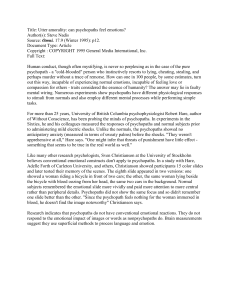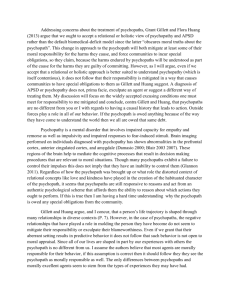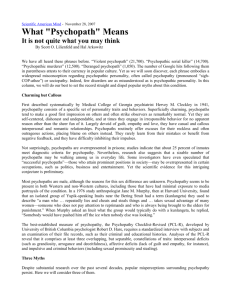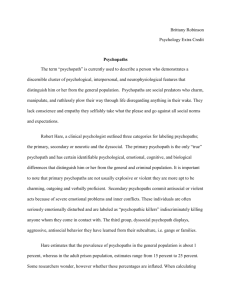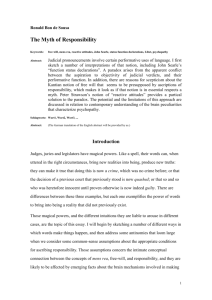Snakes in Suits: When Psychopaths Go to Work
advertisement
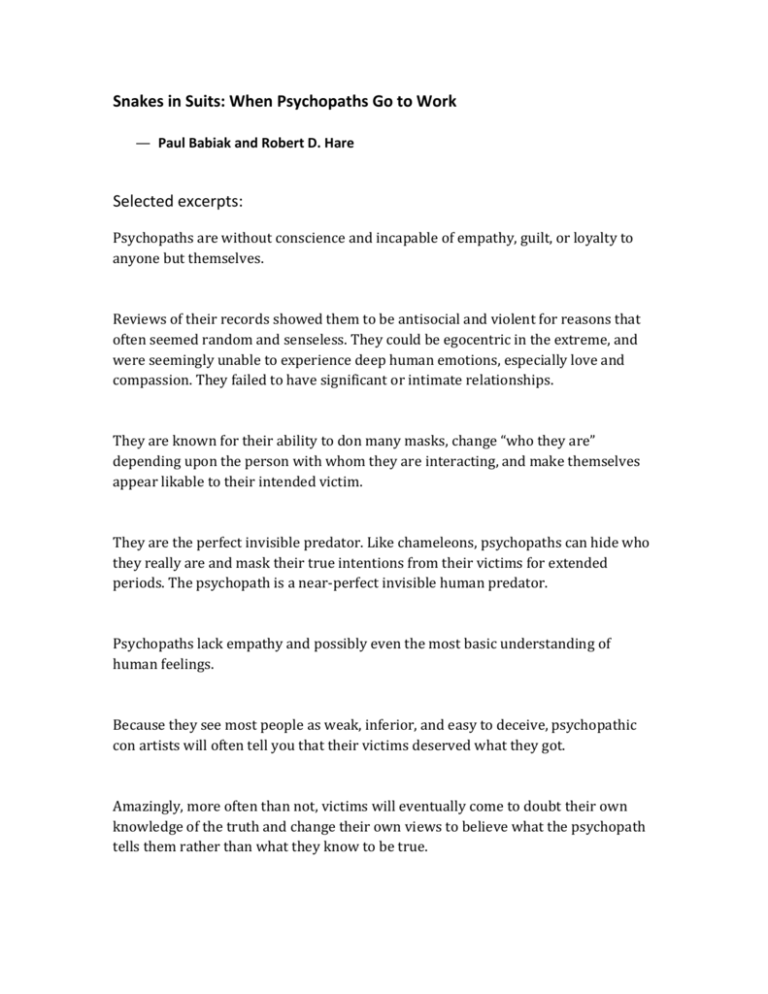
Snakes in Suits: When Psychopaths Go to Work — Paul Babiak and Robert D. Hare Selected excerpts: Psychopaths are without conscience and incapable of empathy, guilt, or loyalty to anyone but themselves. Reviews of their records showed them to be antisocial and violent for reasons that often seemed random and senseless. They could be egocentric in the extreme, and were seemingly unable to experience deep human emotions, especially love and compassion. They failed to have significant or intimate relationships. They are known for their ability to don many masks, change “who they are” depending upon the person with whom they are interacting, and make themselves appear likable to their intended victim. They are the perfect invisible predator. Like chameleons, psychopaths can hide who they really are and mask their true intentions from their victims for extended periods. The psychopath is a near-perfect invisible human predator. Psychopaths lack empathy and possibly even the most basic understanding of human feelings. Because they see most people as weak, inferior, and easy to deceive, psychopathic con artists will often tell you that their victims deserved what they got. Amazingly, more often than not, victims will eventually come to doubt their own knowledge of the truth and change their own views to believe what the psychopath tells them rather than what they know to be true. 2 Psychopaths may even blame the victims for their own misfortune, offering convincing reasons why they got what they deserved! Your ability to recognize psychopathic manipulation is increased if you are not seen as valuable or a threat to the psychopath, and therefore of little interest. Psychopaths invest a lot of mental energy in identifying and manipulating their victims, but they don’t spend much energy trying to uphold a mask for those with little utility to them; Because a psychopath—our new true friend—is an excellent communicator; he or she easily picks out topics that are important to us and reflects sympathetic points of view, sometimes complete with enthusiasm or “emotion” to reinforce the spoken words. For one, the persona of the psychopath—the “personality” the person is bonding with—does not really exist. It was built on lies, carefully woven together to entrap you. It is a mask, In summary, the psychopath’s psychological game involves analyzing the individual’s expectations and desires, and then reflecting them in a psychological mask that is so convincing the person bonds with him or her. Psychopaths often are cunning, master manipulators, able to influence individuals into fulfilling their own selfish ends. They hide their true motivations and project carefully formed personas to capitalize on the needs, expectations, and naïveté of individuals useful to them. Affinity groups—religious, political, or social groups in which all members share common values or beliefs—are particularly attractive to psychopaths because of the collective trust that members of these groups have in one another. 3 This type of fraud is disturbing because of the ease with which a social predator infiltrates, cons, and manipulates affinity groups. Patrons are influential executives who take talented employees “under their wing” and help them progress through the organization. Once this patronage is established, it is difficult to overcome. With a patron on their side, psychopaths could do almost no wrong. There are plenty of coworkers and managers who have little to offer in the way of influence, assets, or potential support. Being ignored, these individuals are in a good position to see what is actually going on. They may realize that the psychopath is not who he or she pretends to be, and may even witness the manipulation of others. Two factors were important: the extensive use of clever impression management techniques, and the use of secrecy. Specifically, their game plans involved manipulating communication networks to enhance their own reputation, to disparage others, and to create conflicts and rivalries among organization members, thereby keeping them from sharing information that might uncover the deceit. Psychopathic workers very often were identified as the source of departmental conflicts, in many cases, purposely setting people up in conflict with each other. “She tells some people one story, and then a totally different story to others. Sometimes she’ll tell one person that ‘so-and-so said this about you’ and then do the same thing with the other,” said one exasperated peer. Clearly, the detractors despised these individuals, and the supporters almost worshipped them. It was as if employees were describing two entirely different people. In a great number of these situations, it seemed that the psychopath could switch from warm and friendly to cold, distant, and almost hostile depending on with whom they were interacting. 4 This dramatic shift from friendly coworker to cold, dispassionate stranger is a consistent element of psychopathic behavior, and affects victims in predictable ways—ways that may work to the benefit of the psychopath. The tables are turned because the credibility of the complaining employee has already been “managed” and undermined. Those working with the employee who was defeated see the demoralizing effects up close and conclude it is not worth fighting the psychopath. Such ethical relativism is part of the reason psychopathic and other unprincipled “entrepreneurs” find it so easy to line their pockets with the unwitting contributions of those whose ethical standards are more fixed. A culture of secrecy in an organization makes it much easier for pretenders to hide and much harder for management to catch them in their lies, Bullies are not as sophisticated or as smooth as the manipulative type, as they rely on coercion, abuse, humiliation, harassment, aggression, and fear to get their way. psychopathic bullies do not feel remorse, guilt, or empathy. They lack any insight into their own behavior, and seem unwilling or unable to moderate it, even when it is to their own advantage. They are adept at manipulating people—pulling the strings—from a distance, in order to get those directly under their control to abuse or bully those lower down in the organization. To the puppetmaster, both the intermediary (the “puppet”) and the ultimate victim are expendable since neither is viewed as a real, individual person. 5 Psychopaths do not understand what others mean by their “feelings,” yet they will attempt to mimic them on demand. This often leads to superficial expressions or even exaggerations of emotion inappropriate to the event being described. The key is to look for emotions appropriate to the story being told, and to be sensitive to how realistic (as opposed to superficial) these emotional expressions appear. Psychopathic responses to perceived “lower-status” interviewers may include condescension, flirting, disparaging side comments, and displays of entitlement, among other things. But psychopaths tend to overreact in response to perceived personal insults or insufficient demonstration of respect for their authority. Excessive or incongruous compliments and flattery should be a signal for you to pay critical attention to what is coming next. Ask yourself, “What does this person really want of me?” The astute psychopath will then listen to you spill your guts about things, events, and people, thereby ingratiating himself with you and providing information that can potentially be used to manipulate you later on in the relationship. Psychopaths are adept at identifying those things that you like least about yourself, and at using them as currency in their dealings with you. Many victims become racked with self-doubt, blaming themselves for whatever has happened. Others deny that there is any problem at all. In each case, doubts and concerns about the psychopaths in their lives are converted into doubts about themselves. 6 The reality is that there is no evidence that psychopaths derive any benefit from treatment or management programs. Should you try to complain about your psychopathic coworker or boss, you may very likely find that the waters have been poisoned against you, and every effort you make to remedy the situation may be seen as confirmation of the “problem employee” reputation that you now have. One psychopathic technique is to create conflict among staff members. Claiming that one person said something negative or derogatory about another is a common approach. Recall that a successful corporate psychopath will already have established a strong influence network, and may already have planted seeds of doubt about your competence and loyalty.
